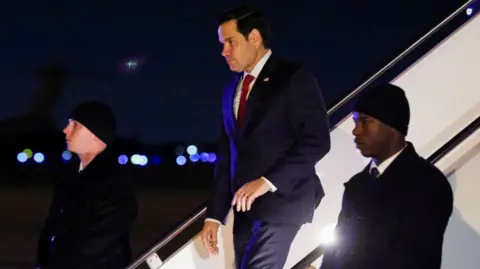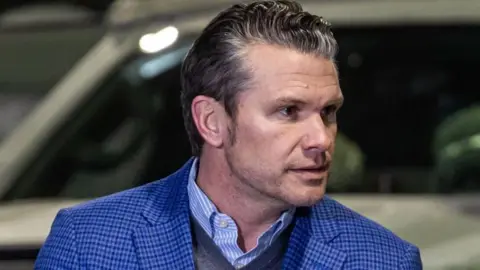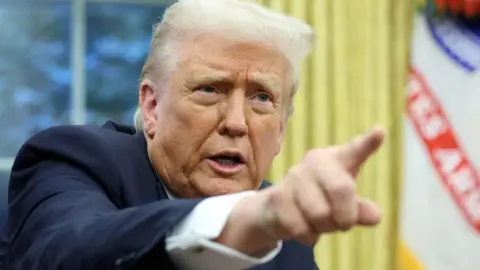State Department Correspondent
 Reuters
ReutersA cracked windscreen forced US Secretary of State Marco Rubio into a rapid U-turn as his plane, en route to the Munich Security Conference, had to turn back an hour into the flight.
America’s top diplomat, his senior officials and the travelling press returned to Andrews Air Force Base near Washington DC on Thursday night.
But despite the mid-air scare the news was already firmly elsewhere. In Europe, US Defence Secretary Pete Hegseth had stunned America’s allies with a speech setting out what many saw as a series of concessions Ukraine would have to make to sign any peace deal with Russia brokered by President Trump.
Hegseth said it was “unrealistic” to think Ukraine could win back its sovereign territory occupied by Russia, as was its demand for Nato membership, adding it was up to European and not US troops to keep the peace.
Critics, including some Republicans in Washington, castigated the speech, saying it gave away all of Ukraine’s leverage ahead of any negotiations. It was, they argued, a US capitulation to Russian President Vladimir Putin.
“It’s certainly an innovative approach to a negotiation to make very major concessions even before they have started,” said former Swedish Prime Minister Carl Bildt, who co-chairs the European Council on Foreign Relation, a think tank.
 EPA
EPAThe following day, Hegseth wound back some of what he had said. He clarified that all options were in fact still on the table for Trump to use as leverage between Putin and Ukrainian President Volodymyr Zelensky.
“What he decides to allow or not allow is at the purview of the leader of the free world, President Trump,” said Hegseth. However he added he had been “simply pointing out realism” and rejected the idea he had offered any undue concessions to Moscow.
As for Rubio, the broken-down plane delayed his arrival in Munich, where his officials were briefing about his own priorities for the trip.
The United States would work for a “just and lasting peace” in which European countries would take the lead in creating a “durable security framework”, they said.
European leaders are expected to meet in Paris on Monday for urgent talks aimed at ensuring that their countries are fully involved in any Ukraine peace negotiations.
The US secretary of state’s position contained no trace of laying out limits for Ukraine in the way the defence secretary had done. Then, also in the German city, Vice-President JD Vance said the US could use “military tools of leverage” to compel Russia to do a deal, appearing to contradict Hegseth who had said no US troops would be deployed to Ukraine.
Later in the Oval Office, the fallout from Hegseth’s speech was put to President Trump – along with the commentary of a Republican senator who described it as a “rookie mistake”, like something a pro-Putin pundit could have written.
Had Trump been aware of what Hegseth was going to say? “Generally speaking, yeah, generally speaking I was,” said the president. “I’ll speak to Pete, I’ll find out,” he added.
 Reuters
ReutersThe three days of to and fro gave some of the first major insights into Trump’s evolving position on one of the most consequential issues he faces – Russia’s full-scale invasion of Ukraine and his vow to end the war – and also into how his administration is formulating and messaging its foreign policy.
On the substance, Hegseth’s speech – alongside Trump’s lengthy statement about an apparently warm phone call with Putin aimed at starting negotiations with Ukraine – sent shockwaves through European capitals, despite Hegseth’s attempts to row back.
“Any quick fix is a dirty deal,” said the European Union foreign policy chief Kaja Kallas of the prospect of a US-led deal with Russia that might leave Ukraine’s voice on the sidelines.
Then there is the question of the way US foreign policy under Trump was being communicated. What happened in Munich seemed to be partly an attempt by his senior officials to interpret and relay Trump’s positions, but that effort resulted in sometimes explosive and often contradictory statements – some of which were then partly diluted or reversed.
It is not yet clear how much this is the result of a new but ill-coordinated administration still clarifying its lines to take internally, as opposed to a deliberate feature of a presidency less concerned about officials freelancing with rhetoric, even if it sows some confusion, so long as they remain loyal to his final word.
Trump’s first term saw a series of high-profile sackings or resignations of top officials who contradicted or disagreed with him, including three national security advisers, two defence secretaries and a secretary of state.
This time around, his appointments have been characterised more frequently by a willingness to show loyalty. Pete Hegseth, who had no previous experience running a military or government or agency, was a Fox News weekend presenter and former National Guard major who aligns strongly with Trump’s thinking and agenda.
His appointment was highly contested and scraped through its confirmation process with three Republican senators voting against him, seeing the result tied 50-50 with JD Vance casting the tie-breaking vote.
 EPA
EPAAs Trump said himself this week he was “okay” with the idea of taking Ukraine joining Nato off the negotiating table, calling it “not practical”.
Hegseth’s comments were hardly out of line with the president’s position – rather they were an amplification of it to an audience anxious to shore up Ukraine’s negotiating position not weaken it.
The challenge for those affected is that the precise position of US foreign policy is having to be divined. One of its features is uncertainty. This may well be deliberate – Donald Trump using the “madman” theory of foreign relations – often attributed to former Republican President Richard Nixon.
This suggests that being powerful but unpredictable is a way to make allies stay close while coercing adversaries. It would also explain a sense of his own officials going rogue but within the parameters of Trump’s broadly known positions.
But as this theory’s name suggests, it also carries considerable risks of mistakes or miscalculation in an already violent and uncertain world.
Trump’s recent proposals for Gaza – emptying it of its Palestinian population to build the “Riviera of the Middle East” under US ownership – were similarly permeated with confusion and contradiction.
While his officials appeared to try to correct some of what he set out – as only “temporary relocation” for example –Trump later doubled down saying it would in fact be “permanent” with no right of return.
As for Rubio – who wants the state department be the most influential government agency when it comes to Trump’s decision-making – his colleagues’ comments at Munich were already overshadowing his own.
His smaller, replacement plane finally landed in Europe – windscreen intact but without the press pool on board, while most of the headlines were also going elsewhere.


